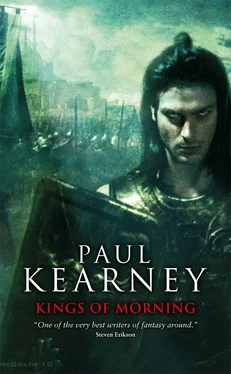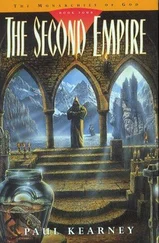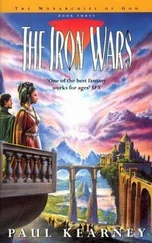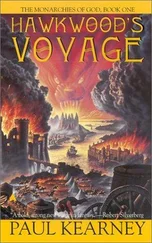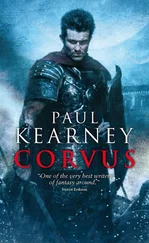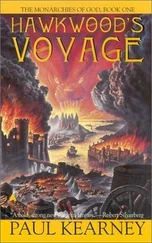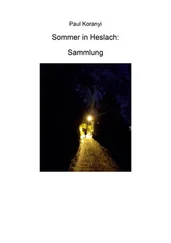Paul Kearney - Kings of Morning
Здесь есть возможность читать онлайн «Paul Kearney - Kings of Morning» весь текст электронной книги совершенно бесплатно (целиком полную версию без сокращений). В некоторых случаях можно слушать аудио, скачать через торрент в формате fb2 и присутствует краткое содержание. Жанр: Фэнтези, на английском языке. Описание произведения, (предисловие) а так же отзывы посетителей доступны на портале библиотеки ЛибКат.
- Название:Kings of Morning
- Автор:
- Жанр:
- Год:неизвестен
- ISBN:нет данных
- Рейтинг книги:4 / 5. Голосов: 1
-
Избранное:Добавить в избранное
- Отзывы:
-
Ваша оценка:
- 80
- 1
- 2
- 3
- 4
- 5
Kings of Morning: краткое содержание, описание и аннотация
Предлагаем к чтению аннотацию, описание, краткое содержание или предисловие (зависит от того, что написал сам автор книги «Kings of Morning»). Если вы не нашли необходимую информацию о книге — напишите в комментариях, мы постараемся отыскать её.
Kings of Morning — читать онлайн бесплатно полную книгу (весь текст) целиком
Ниже представлен текст книги, разбитый по страницам. Система сохранения места последней прочитанной страницы, позволяет с удобством читать онлайн бесплатно книгу «Kings of Morning», без необходимости каждый раз заново искать на чём Вы остановились. Поставьте закладку, и сможете в любой момент перейти на страницу, на которой закончили чтение.
Интервал:
Закладка:
‘Barka,’ he said.
From the huddle of riders a respectful distance behind him, one trotted forward. A Kefre, but low-born, with dark eyes and long hair dyed red as an apple and bound in an oiled queue. He had a sword scabbarded each side of his saddle’s pommel and wore a plain leather corselet studded with bronze. A scar tugged down one corner of his mouth, so it looked like he was leering, but his eyes held no humour.
This was Kouros’s weapons-master; an Arakosan, brought to Ashur fifteen years before by Orsana to teach her son how to be a man. He was also the only person who had ever beaten the young prince, for mistreating a horse. Kouros had gone to his mother at once, and the Arakosan had never laid a hand on him since, but Kouros still remembered the beating. He knew Barka despised him, but he also knew the Arakosan would die for him without thought, because of who his mother was.
‘My prince?’
‘Do we know yet where the imperial tent will be sited tonight?’
‘Yes, lord. The scouts have plotted a site some twenty pasangs ahead, on the outskirts of Kinamish.’
‘And my household?’
Barka pointed below, to where the Imperial road was a long snake of dust, a golden caterpillar inching across the land with black ants crawling within it.
‘Our gear is with the Great King’s caravan, as always, lord.’
Kouros was aching for a bath, some wine, something softer than a saddle to take his bulk. He frowned. The entire army and everyone in it travelled at the pace of the slowest ox-cart in the Great King’s baggage train. And no tent could be pitched before the King’s. It would be many hours yet.
Kouros wiped his face, his palm coming away gritty with dust. Kinamish was a small town with some of the amenities of civilization. It was unnoticeable, unimportant. It was perfect.
A well-mounted man could be there in an hour, if he pushed his horse. The timings had worked well.
‘Let us ride ahead, and make sure the people of Kinamish are ready to receive my father,’ Kouros said lightly.
Barka looked at him. He had an unsettlingly direct gaze that was wholly free of deference. Since Orsana had spoken to him, all those years ago, he had never again ventured to correct the young prince, but Kouros always knew when Barka disapproved of him. He would have rid himself of the scarred Kefre long before, except that he knew — somehow — that Barka could be trusted utterly. The weapons-master might not think much of his prince, but he would never betray him. It was the closest thing to loyalty Kouros had ever experienced. Almost.
‘Very well,’ Barka said. ‘The escort also, my lord?’
‘No.’ No, that might attract attention. Kouros snarled inside at the thought of being patiently taken to task by Dyarnes or another of his father’s veterans. They feared him — all of them — but they still had the casual confidence of old campaigners. And there were things they did not need to know.
‘You and I, Barka — we’ll go alone.’
‘As you wish, lord.’
They pushed the horses hard. Kouros’s riding was graceless but effective; he made the animal do what he wanted, and there was never any emotional connection between horse and rider. He had seen his father commiserate with hardened soldiers on the death of a favourite horse, and had been utterly baffled by the sight. These were grown men with blood on their hands, who would have a thieving slave crucified without a moment’s thought, and they wept over a dead animal.
The big Niseians pounded along willingly enough, for they had been travelling at a crawl all morning. Barka sat his as though stuck to it, moving with the rise and fall of the animal, the reins an irrelevance, held lightly in one hand. He talked to his horse in a low voice now and again, crooned to it like it was a child he wanted to reassure.
Baffling.
The last pasangs of the Heart of Empire rolled along under them, the land rising to meet the Magron mountains, which were a huge cloud now on the western horizon, dun-coloured and tipped with white, forests a darker stubble at their knees.
There was no irrigation system in this part of the world, for the moist easterlies struck the mountains and shed their water freely in tumbled thunderheads every spring and winter. The land was a less violent green than the manicured fields of the Oskus valley, and much of it was given over to pasture. They herded cattle here, and goats to clear up after them. The people were the shorter, darker, upland hufsan who made up the bulk of the empire’s populations.
Herd boys stopped to stare at the two superbly mounted Kefren who galloped past them, and Barka, with a boyishness quite unlike him, waved at those they passed with a white grin splitting his leathered face.
He is happy, Kouros realised. He is genuinely happy to be galloping along, slathered in sweat, miles from the capital, with only the ground to sleep on and the prospect of some half-seared campfire meat to eat tonight.
To ride a horse, to use a bow, to tell the truth. Those were the ancient tenets of life for the Kefren, still given lip service even in the opulent luxury of Ashur’s palaces. Kouros’s mother never tired of telling him that in Arakosia the nobles still trained their sons how to shoot from the saddle, that a Kefre’s word was counted a contract as good as any scribe’s scrawl.
But Orsana had been in the Harem these thirty years and more. What did she know?
Kouros had been at intrigues since he was a child, recognising his elevated status and working on it, utilising slaves and tutors and bodyguards and their dependence on his favour. No bows or horses, there, and not much of the truth, either. Leverage was what counted; the ability to hold a person’s dismissal or disgrace over their head.
He smiled a curious half-smirk as he rode along.
Nobles had given him their wives for a night to buy his favour, and the more unwilling the woman, the sweeter it had tasted. He loved to be there to give the husband back his wife the next morning, to see the eyes of them both. That moment was better than the sex itself.
‘Kinamish,’ Barka said, pointing, ruining his sordid little daydream.
‘I am not blind,’ he snapped.
‘Lord, we should slow our pace, rest the horses.’
‘We’re nearly there, Barka. They can rest all they like when we reach the town.’
‘As you wish, my lord.’ Barka’s high spirits withered. He was again the grim-faced guardian.
They dismounted in a tawny square of mud-brick buildings. Kinamish was not important enough to need a wall, and this far into the Heart of Empire it would not have occurred to the inhabitants to build one. Asuria had not known the footfall of war for generations, and only the greatest of her cities still maintained defences, more out of tradition than anything else.
There was a tavern, with a vine-shaded loggia. Leaving Barka with the steaming horses, Kouros sat himself there. He dropped his komis from his face and slapped the dust from his clothes with his riding-gauntlets. Slowly, as the local drinkers, farmers and ne’er-do-wells watched, the colours emerged from his garments. Kingfisher blue, imperial purple, and the silver embroidered horse heads of the royal house. The loggia cleared around him, and he smiled again, clicking his fingers for service.
‘Wine, and cold water,’ he said without looking up.
‘At once, my lord.’
He did not seem surprised when he was joined at his table by another traveller, who sat down beside him without ceremony and reached for the communal olive-bowl, wetting his fingers on the oil and then applying it to sunburnt patches on his nose. With the same hand the newcomer dropped the folds of his own komis, and sighed. He was a broad-faced Kefre with a cropped head and eyes as bright as cornflowers. His skin and his clothes were all the colour of the dust that puffed in pale zephyrs around the little square. When the water arrived he drank straight from the jug, and, wiping his mouth, he left on his face a smear of clean skin the colour of new wood.
Читать дальшеИнтервал:
Закладка:
Похожие книги на «Kings of Morning»
Представляем Вашему вниманию похожие книги на «Kings of Morning» списком для выбора. Мы отобрали схожую по названию и смыслу литературу в надежде предоставить читателям больше вариантов отыскать новые, интересные, ещё непрочитанные произведения.
Обсуждение, отзывы о книге «Kings of Morning» и просто собственные мнения читателей. Оставьте ваши комментарии, напишите, что Вы думаете о произведении, его смысле или главных героях. Укажите что конкретно понравилось, а что нет, и почему Вы так считаете.
